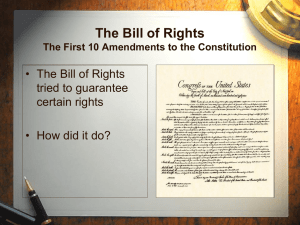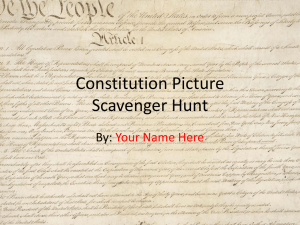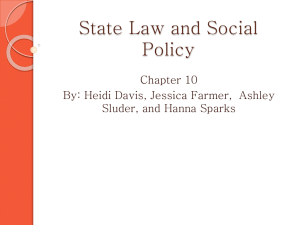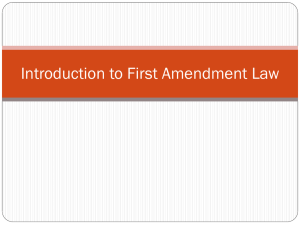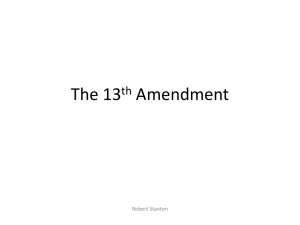PowerPoint Presentation - The Bill of Rights The First 10
advertisement
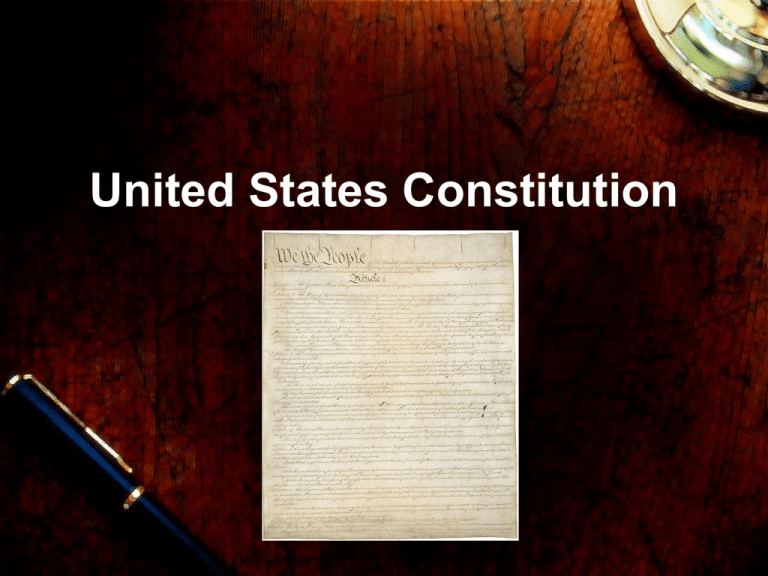
United States Constitution Background • Is the supreme law of the land of the United States of America • The first three Articles of the Constitution establish the rules and separate powers of the three branches of the federal government: a legislature, an executive branch, and a federal judiciary headed by the Supreme Court. – The President nominates new members to the Supreme Court, but the Senate must approve the nomination by a majority vote. This is part of the system of checks and balances that is supposed to prevent abuse of power. United States Constitution: The Bill of Rights The First 10 Amendments to the Constitution • Take notes on the slides as they appear. Who determines what the Bill of Rights mean? • The Supreme Court makes rulings on the meaning • The Supreme Court balances the rights of the individual with the needs of society Individual?? Society?? 1st Amendment • The 1st Amendment guarantees freedom of religion, speech, the press, assembly, and petition. • • • • • • This means that we all have the right to: practice any religion we want to to speak freely to assemble (meet) to address the government (petition) to publish newspapers, TV, radio, Internet (press) QuickTime™ and a TIFF (Uncompressed) decompressor are needed to see this picture. Establishment and free exercise clause often conflict with each other • In schools, the religion issue is most prevalent • If a student raises his hand and says “teacher, can we say an opening prayer before this test” • If the teacher says: • “Yes”, It looks like establishment of religion • “No”, It is deigning a student free exercise. 'I pledge allegiance to the Flag of the United States of America for which it stands, one nation, indivisible, with liberty and justice for all. Establishment clause-Government Cans • Teach about religions in school • Allow voluntary prayer in many examples • Transport students to a religious school • Read Bible for culture or literacy content Cannot • Set a state religion • Government cannot order a prayer • Teach religious doctrine in the school • Pay seminary teachers • Teach creationism Free Exercise—The person Can Cannot • Choose whatever religion • Lead a prayer in most examples • Ask questions about religions • Worship who ever you want • Break the law and claim it is religious belief • Raise children without education • Deprave children of basic needs Free speech—limits on the person • Threaten to blow up airplanes, schools or the president • Sexual harassment • Create too much social chaos • Extremely crude language in a public form • Disrespectful, vulgar language in schools • Hate crimes Freedom of the press-the press Can • Print any political position • Make fun of people, especially politicians • Expose wrongs by the government • Say things you might not agree with Cannot • Libel– intentionally injuring a person’s reputation by false facts • Disclose defensesecurity secrets • Detail how to make a certain weapons Freedom of Assembly--Individual Can Cannot • Protest • Parade (with a permit) • Parade chanting hate slogans • Gang members can congregate in public • Protest by throwing rocks and breaking windows • Hang out on private land against owners will—loitering • Teen curfew 2nd Amendment • The 2nd Amendment protects the right to bear arms, which means the right to own a gun. • Some people believe that the government is the enemy, and citizens must continue to protect themselves. • Some believe that the level of violence is so high in the United States because the number of guns available is too high, and too many people have guns. • There is a popular saying that, "If you outlaw guns, only outlaws will have guns." Another popular saying is, "Guns don't kill people, people do." 3rd Amendment • The 3rd Amendment says “No soldier shall, in time of peace be quartered in any house, without the consent of the owner, nor in time of war, but in a manner to be prescribed by law.” • This means that we cannot be forced to house or quarter soldiers. 4th Amendment • The 4th Amendment protects the people from unreasonable searches and seizures. • This means that the police must have a warrant to enter our homes. It also means the government cannot take our property, papers, or us, without a valid warrant based on probable cause (good reason). 5th Amendment • The 5th Amendment protects people from being held for committing a crime unless they are properly indicted, (accused) • You may not be tried twice for the same crime (double jeopardy) • You don’t have to testify against yourself in court. (Self-incrimination) 6th Amendment • The 6th Amendment guarantees a speedy trial (you can’t be kept in jail for over a year without a trial) • an impartial jury (doesn’t already think you are guilty) • that the accused can confront witnesses against them • the accused must be allowed to have a lawyer 7th Amendment • The 7th Amendment guarantees the right to a speedy civil trial. • A civil trial differs from a criminal trial. A civil trial is when someone sues someone else. A criminal trial is when the state tries to convict someone of a crime. 8th Amendment • The 8th Amendment guarantees that punishments will be fair and not cruel, and that extraordinarily large fines will not be set. 9th Amendment • All rights not stated in the Constitution and not forbidden by the Constitution belong to the people. • This means that the states can do what they want if the Constitution does not forbid it. 10th Amendment • The 10th Amendment states that any power not granted to the federal government belongs to the states or to the people. • Examples: The states determine the rules for marriages, divorces, driving licenses, voting, state taxes, job and school requirements, rules for police and fire departments. • The 14th Amendment to the Constitution was ratified on July 9, 1868, and granted citizenship to “all persons born or naturalized (established) in the United States,” which included former slaves recently freed. In addition, it forbids states from denying any person "life, liberty or property, without due process of law" or to "deny to any person within its jurisdiction the equal protection of the laws.” By directly mentioning the role of the states, the 14th Amendment greatly expanded the protection of civil rights to all Americans and is cited in more litigation than any other amendment. 14th Amendment Does the 14th Amendment give states more power, or place more limits on state power? How? Would each of these examples violate the Fourteenth Amendment? If so, which part? Explain. • Arizona passes a law that babies born to illegal immigrants in Arizona are not U.S. citizens. • Kansas law requires black and white children to go to different schools. • A poor man in Florida is convicted of burglary and sent to prison, but did not have a lawyer because he could not afford one.


